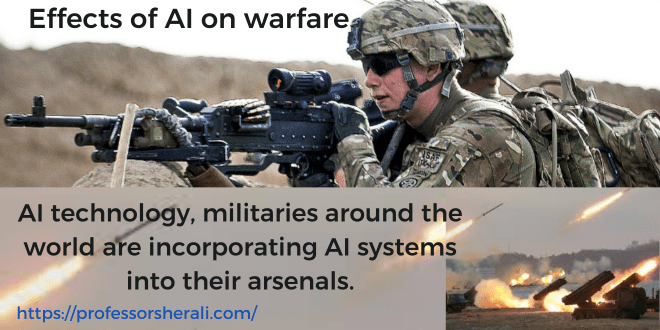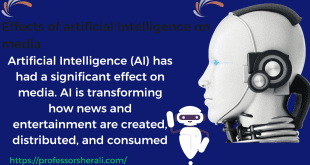Artificial intelligence (AI) has revolutionized many aspects of modern society. Impact of AI on warfare is no exception. With advances in AI technology, militaries around the world are incorporating AI systems into their arsenals. In this article, we will explore the effects of AI on warfare, including its ability to conduct remote operations, process large amounts of data quickly, transform cyber warfare, and enhance soldier performance. However, the increasing use of AI in warfare also raises ethical concerns, such as the potential for autonomous weapons to operate without human oversight.
Remote Operations: The Use of AI-Powered Drones
One of the most significant impacts of AI on warfare is the ability to conduct remote operations. Unmanned aerial vehicles (UAVs), also known as drones, have become a crucial component of modern militaries. With AI-powered drones, soldiers can conduct reconnaissance and surveillance missions without ever leaving their bases. These drones can fly long distances, identify targets, and even engage in combat without putting human lives at risk.
Data Processing: AI-Powered Analytics
Another significant effects of AI on warfare is the ability to process large amounts of data quickly. AI breakthrough can analyze vast amounts of information from multiple sources, providing intelligence analysts with actionable insights in real-time. With AI-powered analytics, military commanders can make informed decisions quickly, increasing the effectiveness of their operations.
Cyber Warfare: AI as a Defense Against Cyber Attacks
AI is also transforming the way militaries engage in cyber warfare. effects of AI on warfare online system is also to be considered. Cyber attacks have become an increasingly common form of warfare, and AI can help protect against them. AI systems can detect and respond to cyber attacks in real-time, preventing damage to critical infrastructure and military systems.
Enhancing Soldier Performance: The Use of AI-Powered Exoskeletons
AI exoskeletons are wearable devices that can enhance the physical abilities of soldiers. These devices can improve a soldier’s strength, endurance, and agility, making them more effective in combat. Exoskeletons can also reduce the risk of injury and fatigue, allowing soldiers to perform at a higher level for longer periods.
Predictive Maintenance: AI-Powered Maintenance
Artificial Intelligence-powered maintenance is another application of AI on warfare. Military equipment requires regular maintenance to ensure it is in good working order, and AI-powered method can help predict when maintenance is needed. By analyzing data from sensors and other sources, AI-powered can predict when equipment is likely to fail and schedule maintenance before a problem occurs.
Ethical Concerns: The Potential for Autonomous Weapons
However, the increasing use of AI in warfare also raises ethical concerns. One of the biggest concerns is the potential for AI-powered weapons to operate independently, without human oversight. This raises the question of who would be responsible if an AI-powered weapon caused unintended harm. Additionally, there are concerns about the potential for AI to be hacked or manipulated, leading to unintended consequences.
Target Identification: AI-Powered Targeting Systems
AI is also being used to improve the accuracy of targeting systems. AI effects on warfare are important in future. AI mechanism can analyze images and other sensor data to identify potential targets and distinguish them from civilians or non-combatants. This improves the accuracy of missile and bomb strikes, reducing the risk of collateral damage.

Logistics and Supply Chain Management: AI-Powered Logistics
AI’s logistics can improve the efficiency of military supply chains. By analyzing data on equipment, personnel, and supplies, AI algorithms can optimize routes, reduce downtime, and ensure that resources are available when and where they are needed.
Simulations and Training: AI-Powered Simulations
AI-powered simulations can provide soldiers with realistic training scenarios that simulate real-world conditions. These simulations can help soldier’s preparation for a variety of situations and this situation combat operations to disaster response. Its algorithms can adjust the difficulty of the simulations to match the skill level of the soldiers that is making the training more effective.
Decision Support: AI-Powered Decision Making
AI-powered decision support systems can help military commanders make informed decisions quickly. By analyzing data on enemy positions, troop movements, and other factors, Artificial intelligence can provide recommendations on the best course of action that can help commanders respond to changing situations . It makes decisions that minimize risk to soldiers and civilians.
In summary, AI has a wide range of applications in warfare, from remote operations to logistics and supply chain management. While the use of AI can enhance military effectiveness, it also raises ethical concerns about the use of autonomous weapons and the potential for unintended consequences. As AI technology continues to evolve, it will be important for militaries to balance the benefits of AI with the potential risks and consequences.
 Professor Sher Ali My site
Professor Sher Ali My site



